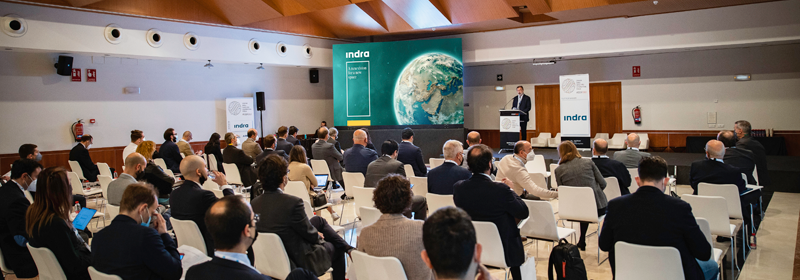- The launch and recurrent maintenance of mega space constellations requires the transformation of the sector to provide it with industrial production capabilities
- The new commercial dimension of space and the strong EU interest in the sector, with expected investments of more than 2.4 billion euros, offer great business opportunities
- The availability of NextGen Funds is a unique opportunity to gain a strong position in one of the most intensive industrial sectors in innovation and technological development

Indra, one of the leading global technology and consulting companies, is committed to the development in Spain of a New Space sector with the capacity to lead large space projects and launch massive satellite constellations into space to take advantage of the business opportunities that are emerging in this business segment, which is critical for the digitalization of transportation, communications, defence and security, among other areas.
Last Wednesday, during his speech at the opening of the Spanish Small Satellite International Forum – which is being held from February 23 to 25 in Malaga – Indra's Director of Defence and Space Systems, Domingo Castro, highlighted "the need to undertake a well-planned transformation of the sector to respond to the new challenges posed by Space" and explained that "although Spanish Space companies have the capacity to respond to the most complex technological challenges, they are not geared up to face recurring projects that require the industrial production of a large number of systems or satellites".
Last year, together with Enaire, Indra created Startical, a company that will put into orbit a constellation of 240 small satellites to provide services that will improve air traffic management and safety around the world. More recently, the company has become a shareholder of Sateliot, which will launch a hundred satellites to facilitate the development of an Internet of Things with 5G connectivity.
For Indra, Startical and Sateliot are projects that lay the foundations for consolidating the new Space industry in Spain. "The high replacement rate of the satellites in these constellations, as well as the recurring opportunity to update the payloads, supports the viability of a business model with the incorporation of new capacities and services in short cycles of only 3 to 5 years, which opens up the possibility of exploitation under Satellite as a Service schemes," he said.
Having a competitive industrial network will also allow us to lead other constellation deployment projects that are already emerging around the world. In the coming years, the number of satellites in orbit will treble from 2,600 in service today to more than 8,000 in 2024.
For the Indra executive, the availability of the NextGen Funds is a probably once-in-a-lifetime opportunity for the transformation and positioning of Spain's industrial sector in the Space segment. "The revolution of the Spanish space industrial sector has to happen now," he stressed.
In his opinion, the sustainability of the European Commission and ESA budgets allocated to space, together with the emergence of new Flagship Programs, represents another important growth opportunity for Space. Following the success achieved in major programs such as Galileo and Copernicus, the Commission has recently presented an ambitious program aimed at ensuring "secure and sovereign connectivity of European communications, which could have an investment of 2.4 billion euros, with the added contribution of states and private investors, which would raise this figure to 6 billion".
Domingo Castro pointed out that the EU has progressively become aware of the dual nature and growing civil and military convergence of space and quoted the words of the European Union High Representative, Josep Borrell, who, at the last European Space Conference, stated that "our freedom of action depends on reliable, secure and autonomous access to Space”.
To guarantee this freedom of access, avoid collisions with space debris and hostile actions or attempts to prevent the use of radio space, it is necessary to develop space surveillance and object tracking (SST) capabilities, to have an aerospace defence system, and to develop a European system to manage increasingly congested satellite traffic.
In this field, Indra combines a strong leadership in the Defence and Space sector with an exceptional position in the air traffic market, where it is one of the largest system providers in the world, with solutions implemented in more than 160 countries.
In the coming years, satellites will play a central role in the digitalization of any economy and will be key to ensuring the competitiveness and sustainability of all sectors. In the realm of defence, satellite constellations will provide the hyper-connectivity that the armies of the future need to operate in heavily digitalized theaters of operations, where platforms and soldiers need to exchange data continuously to gain an advantage over the adversary.
About Indra
Indra (www.indracompany.com) is one of the leading global technology and consulting companies and the technological partner for core business operations of its customers world-wide. It is a world-leader in providing proprietary solutions in specific segments in Transport and Defense markets, and a leading firm in digital transformation and Information Technologies in Spain and Latin America through its affiliate Minsait. Its business model is based on a comprehensive range of proprietary products, with a high-value focus and with a high innovation component. In the 2021 financial year, Indra achieved revenue of €3.39 billion, more than 52,000 employees, a local presence in 46 countries and business operations in over 140 countries.